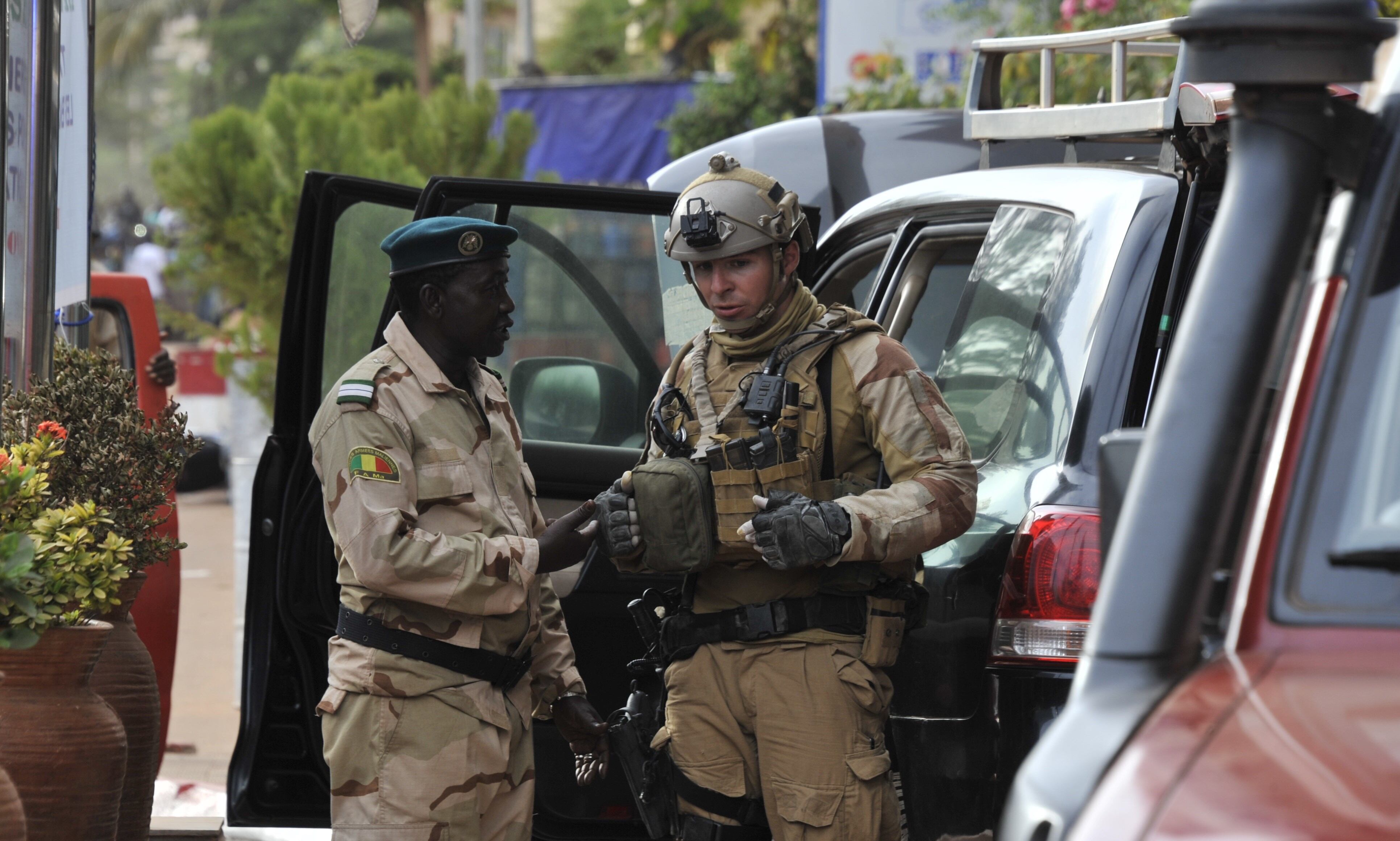Top U.S. military officials believe that a group linked to al-Qaida is responsible for Friday's terrorist attack on a Western hotel in Mali, located in a region of West Africa where the Islamic State group has little to no influence.
"The Islamic State does not have that kind of impact down in that area," said Army Gen. David Rodriguez, chief of U.S. Africa Command, shortly after Friday's attack. "It's probably someone associated with al-Qaida in the Islamic Maghreb because, again, that is where they have the reach."
Rodriguez, speaking to a group of reporters in Washington, D.C., said the influence in Africa of the Islamic State group, also known as ISIS or ISIL, is largely limited to L:ibya.
But he offered a detailed analysis of several other extremist groups threatening Africa, including al-Qaida in the Islamic Maghreb in the north; al-Shabab in Somalia; and Boko Haram, based mainly in Nigeria.
Five U.S. Defense Department personnel initially were caught in the midst of Friday's attack, during which 10 gunmen shouting "Allahu Akbar" stormed the Radisson Blu, a hotel popular with foreigners visiting Mali's capital, and took about 170 guests hostage inside.
The incident ended after Malian security forces cleared the building floor by floor. Dozens of people were reported dead, according to The Associated Press.
For now, Rodriguez said, Libya and Egypt are the only parts of Africa where the Islamic State has successfully extended its reach beyond its base in Iraq and Syria.
ISIS is "creeping" into Egypt, primarily in the Sinai Peninsula, but is gaining a stronger foothold in Libya, where a chaotic civil war offers easy freedom of movement and fertile territory for recruiting, Rodriguez said.
"Six or so groups have pledged allegiance to ISIS," he said of Libya. "That has included people coming back from Iraq and Syria and it's included some leadership as well as some resourcing, so that is really where the strongest link is."
To some degree, the dynamics involve existing extremists changing loyalties. "Part of it is, of course, the branding piece, and the shifting of who you are working with and who is going to support you," Rodriguez said.
The AFRICOM commander questioned the declared ties between ISIS and Boko Haram, the Nigeria-based extremist group best known for its kidnapping of 276 schoolgirls in April 2014.
The U.S. military has supported the search for those girls, but the effort so far remains unsuccessful. The Pentagon in October sent about 300 troops to Cameroon to gather intelligence and help local forces fight Boko Haram.
"Boko Haram has been the most violent group for a couple of years" in Africa, Rodriguez said, but added: "I don't think that has any direct link to the ISIS piece."
Boko Haram "has pledged their allegiance [to ISIS] and there have been some connections, but not a huge amount of resourcing yet," he said. "They are really much more of a regionalized or localized threat."
In East Africa, the al-Shabab group and its insurgency in Somalia is the primary extremist threat.
"Al-Shabab continues to be an al-Qaida-inspired/linked terrorist group that has threatened attacks" abroad, Rodriguez said.
But facing pressure from occasional U.S. airstrikes and a multinational African force known as the African Union Mission to Somalia, the groups' capabilities, for now, are limited, Rodriguez said.
"With all the activities going on right now, I don't think they have the capacity to" mount an attack overseas, he said.
Al-Qaida in the Islamic Maghreb remains active in other parts of North Africa as well as northeastern African nations like Mali and Chad.
ISIS "has tried to move across North Africa, but they've had a tough time getting anywhere past Libya because the countries have done a pretty good job" of blocking the group's spreading influence, Rodriguez said.
Andrew Tilghman is the executive editor for Military Times. He is a former Military Times Pentagon reporter and served as a Middle East correspondent for the Stars and Stripes. Before covering the military, he worked as a reporter for the Houston Chronicle in Texas, the Albany Times Union in New York and The Associated Press in Milwaukee.





